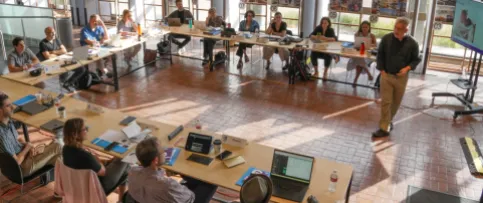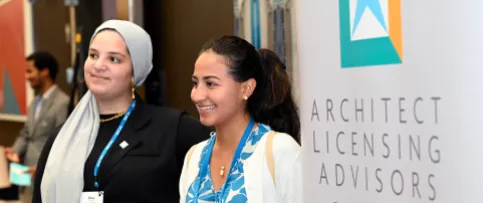On June 24-26, 2021, members from the 55 U.S. architecture licensing boards convened for the National Council of Architectural Registration Boards’ (NCARB) 2021 Annual Business Meeting. Conducted with both in-person and virtual options to ensure the health and safety of all attendees, the meeting provides a forum for NCARB members to elect the incoming Board of Directors, vote on important resolutions, and shape the agenda for the Council’s next fiscal year (which begins on July 1). During the meeting, attendees also had the opportunity to participate in a town hall, engage in a series of workshops, and receive updates on NCARB’s work over the past year.
Learning From the Past, Reimagining the Future
On Thursday, historian Margaret O’Mara delivered a keynote presentation exploring how politics, emerging technologies, and economic trends have shaped leading industries—and what the architecture profession can learn from past successes and failures. “When it comes to the built environment … crises create opportunity for thinking differently—for big, bold ideas to get traction. But big, bold ideas still have to reckon with existing [communities and infrastructure]," said O’Mara. O’Mara’s presentation offered helpful insights into how NCARB can continue to balance reasonable regulation with shifting technologies and cultural norms.
Reflecting on FY21
On Friday, FY21 President Robert M. Calvani, FAIA, NCARB, offered a reflection on NCARB’s accomplishments over the past year. Calvani’s remarks included updates on the Incidental Practice and Responsible Charge task forces, as well as efforts undertaken amid the COVID-19 pandemic—including the launch of online proctoring for the Architect Registration Examination® (ARE®).
“In the past 12 months, we have once again seen that our Council has remained resilient, has met the challenge of maintaining and improving our tools to protect the public, and has sustained momentum with new ways of engaging with all of our stakeholders,” said Calvani. “Our over-400 volunteers have managed not only to do the work, but to ‘Go Further.’”
Calvani also reviewed the Council’s efforts to improve equity, diversity, and inclusion (EDI) over the past year, resulting in greater representation in the volunteer pool and at the leadership level.
End-of-Year Updates
Attendees received an update on NCARB’s current financial status from Treasurer Jon Alan Baker, FAIA, NCARB, LEED AP. This report will be available later in 2021 as part of NCARB’s FY21 Annual Report.
NCARB CEO Michael Armstrong provided an update on the organization’s resiliency and connectivity efforts that enabled ongoing progress on key initiatives during the pandemic. He also reported on FY21 staff accomplishments, including the launch of online proctoring, upgrades to services for licensing boards, and a renewed focus on organizational health.
“In the coming year, our volunteers, staff, and board, are going to be challenged to [reimagine] the licensure framework from scratch. We have to have these conversations to see if we can unearth new approaches and not be static,” said CEO Armstrong, emphasizing that it was important that the licensure candidate community be a part of these conversations. "There’s a credibility gap if we don’t bring the voice of licensure candidates to the table."
Attendees had the opportunity to ask leadership questions about trending topics during a town hall, with discussions around diversity, the exam, and member services.
Looking Ahead to FY22
Incoming FY22 President Alfred Vidaurri Jr., NCARB, NOMA, FAIA, shared his vision for the year ahead. During his term, Vidaurri will focus on efforts to explore licensing models of the future and to improve EDI at the organizational level.
“I am honored to be the first Latino president in this organization’s 102-year history. But I look forward to the day when we no longer have to call out the first, or the second, or the third, but can celebrate the vision of the individual," said Vidaurri.
Resolutions
During the meeting, members voted on several resolutions—including a refresh of NCARB’s Model Law and a proposal to encourage EDI at the national level by establishing shorter term limits for Board of Directors positions. Members also retired several historical resolutions, moving NCARB to a neutral position regarding the licensing of interior designers.
FY22 Board of Directors
Delegates elected members of the FY22 NCARB Board of Directors . Members of the FY22 Board of Directors include:
- President/Chair of the Board Alfred Vidaurri Jr., NCARB, NOMA, FAIA
- First Vice President/President-elect Bayliss Ward, NCARB, AIA
- Second Vice President Jon Alan Baker, FAIA, NCARB, LEED AP
- Treasurer Kenneth R. Van Tine, AIA, NCARB, LEED AP
- Secretary Edward T. Marley, NCARB, AIA, LEED AP
- Director, Region 1 Janet L. Hansen, AIA, NCARB, LEED AP
- Director, Region 2 Philip M. Leinbach, NCARB, AIA, CSI, REFP
- Director, Region 3 Richard H. McNeel, AIA, NCARB, LEED AP
- Director, Region 4 John Patrick Rademacher, AIA, NCARB
- Director, Region 5 David W. Hornbeek, AIA, NCARB
- Director, Region 6 Sylvia Kwan, FAIA, LEED AP
- Member Board Executive Director Cathe M. Evans
- Public Director Gary R. Ey, CDT





